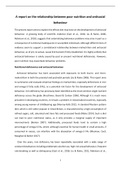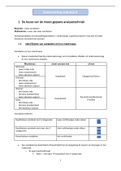Overig
Antisocial behaviour & Nutritional Deficiencies (A psychology report)
- Vak
- Instelling
The present report aims to summarize and evaluate empirical findings on dietary inadequacies, deficiencies in iron & Omega 3 FAs in particular, as potential risk factors for the development of antisocial behaviour. Assignment type: Report, Level 10, Referencing style: APA, Grade awarded: A
[Meer zien]





